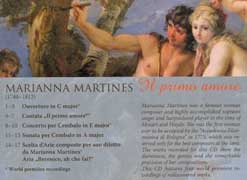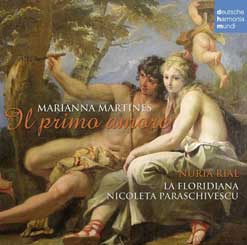The world of women composers is always a source of
surprises, most of all because up until now it had always been given minor
importance in the history of music as people know it.
After the story
of the great Bolognese pianist (Maria Brizzi Giorgi), we want to recall
the life of another excellent artist whose bicentennial of the death we
celebrate in 2012: Marianna von Martines.
Born in Vienna in 1744 in a
family of diplomats of Neapolitan origin, sister of the Director of the
Imperial Library, Marianna von Martines was a composer, a singer and
harpsichordist in contact with musicians and personalities of the world of
culture from all Europe. She studied music with Haydn but, as she wrote in
a letter to Father Martini: "Being persuaded that to succeed in music one
needs other knowledge, I set about acquiring, in addition to German and
Italian (my native tongues), a familiarity with French and English in
order to be able to read the fine poets and writers who distinguish
themselves in it." A cultural education in which the presence of Pietro
Metastasio, who lived in the Martines palace, was decisive: "But in all
these my studies, the chief planner and director always was, and still is,
Signor Abbot Metastasio who, with the paternal care he takes of me and of
all my numerous family, renders an exemplary return for the incorruptible
friendship and tireless support which my good father lent him up until the
very last days of his life." To the reputation of Marianna, was only
missing the title from Bologna's Philharmonic Academy, the highest title
for a musician of the time. She sent a few of her compositions to Father
Martini who responded: "Not only from certain compositions which your most
Illustrious Ladyship designed to send me some time ago, but also from the
praises with which your worth has come to be extolled in, and particularly
by Signore Saverio Mattei (...), I have conceived for your skill in the
art of musical composition a singular esteem which has induced me to seek
a unique brilliance for this our Academy of Filarmonici (...) to enter
into the membership rolls your praiseworthy name."
At the age of 16,
Marianna wrote sacred and secular works played in churches and in
concerts, and not only in Vienna;
at 24, she is in contact with Saverio Mattei, juriconsult,
musician and literary critic from Calabria and friend of Metastasio, who
set music for the Psalms which are then presented all over Europe. It is
the beginning of an international repute that 'obligates' the
musician-travellers of the eighteenth century to participate in musical
evenings at the Martines Palace. Among these, Englishman Charles Burney,
who wrote: "After hearing praises on this young woman's talent, I wanted
to listen to her and converse with her. She accepted in the most
spontaneous way, without excessive ostentation, and without a lot of
persuading. Her performance exceeded all my expectations: Italian
hyperboles would help me if I were writing in that language... I will only
say that the lady met a perfection that I have never seen in any other
musician." On May 25th, 1773, Marianne is named Philharmonic Academician:
she is the first woman composer who received this honour and one of the
few women in the history of the Academy. Recognized at the international
level, she exercises her activities however only in Vienna where are
executed publicly and privately her numerous compositions. Her home is the
venue for very important concerts where visiting artists performed
such as Mozart. Close to the end of the 80s, her great friends Martini and
Metastasio having disappeared, Marianna also gradually vanished: she
directed a school of music and her home remained one of the venues for
Viennese culture, but the death of her brother and, most of all, her
unmarried state obligated her to a progressive and forced retirement. The
last 25 years of her life are filled with silence, until her death, on
December 13th, 1812.
What remains is her music, feminine testimony of
the great period of Viennese classicism.


